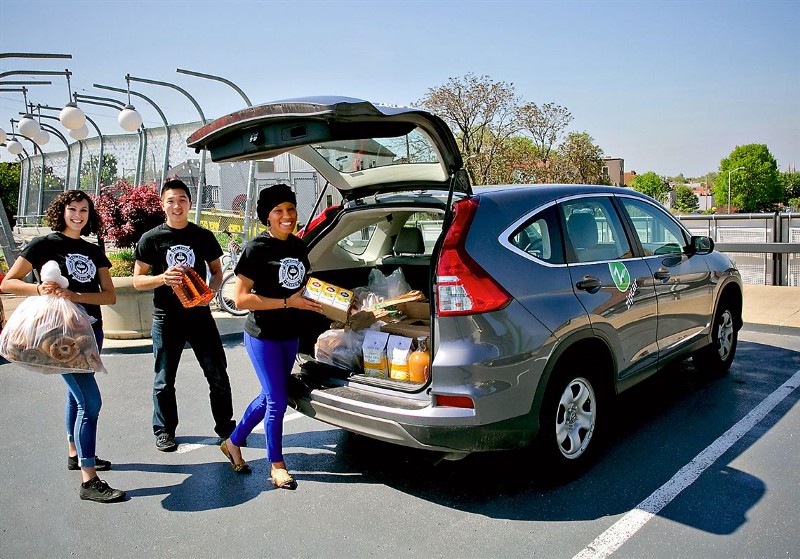By Anniston Bieri
It’s a typical scenario at any all-you-can-eat establishment: you go in with great ambitions and a can-do spirit and take two slices of pizza. It’s cool, you can do it. But then you can’t — and that extra slice that you really didn’t need ends up in the trash (or compost if you’re dining in Chatham University’s Anderson dining hall).
Even if that pizza is composted, it’s not like it’s supposed to be there. Where would it have ended up if you didn’t take it, though? For Chatham, the answer is that it goes to 412 Food Rescue.
412 Food Rescue is a Pittsburgh-based nonprofit organization founded by Leah Lizarondo. The organization works with volunteers who take food that would otherwise go to waste and distributes it to organizations that serve communities who need it, “[redirecting] unsellable yet viable, fresh, healthy food to those who are food insecure,” the nonprofit’s website explains.

The program also accepts produce that doesn’t meet the cosmetic criteria of grocery stores, and other foods untouched by consumers, and has saved more than 4.2 million pounds of food since its launch a few years ago.
“We have a whole system [for getting] information about rescues, finding a home for that donation, and then making sure that our nonprofit picks it up,” says Hana Uman, senior program manager for 412 Food Rescue and a 2015 Chatham food studies graduate. “So we really act as a middle person, we are a dispatcher for food.”
About 40 percent of the food grown and packaged in the United States goes to waste. Globally, about 1.3 billion tons of food is wasted each year.
“We have one in seven people in Allegheny County who experiences food insecurity. There is all of this food going to waste when we could be feeding people. It’s something that could be tackled right away,” Uman says. “People need food, and we can get them food right away with all of the surplus that we have.”
Food waste also has significant effects on the environment, as 97 percent of the waste ends up in landfills where the food cannot properly decompose. It’s also the third largest contributor to greenhouse gas emissions.
Chatham is an ecologically conscious school and a participant in the Pittsburgh 2030 District program, committed to reducing waste, energy and water usage by 50 percent from its initial baseline by 2030. Chatham employs a few other measures, as well, to lessen food waste on campus. Eden Hall is able to provide food as it is demanded (whereas Anderson dining hall, which caters to a much larger portion of the student body, must prepare a large amount of food to accommodate for many anticipated students).
Anderson began using half pans of food, opposed to full-sized ones, to ensure that there’s enough food to meet demand while also minimizing what is wasted in the rest of the tray. The trays of food that aren’t placed onto the serving table are collected each Saturday by a participant of 412 Food Rescue, which distributes the food to a senior center in Greenfield.
Despite these measures, Chatham has produced 412 tons of solid waste (not exclusively food waste) and 297 tons of composted waste as of October 2018. This number has increased dramatically since last year, says Mary Whitney, Chatham’s director of sustainability.
“The food waste that’s happening at Chatham is [produced by] the students,” Whitney explains. “The walk through the line, help yourself sort of thing [in Anderson dining hall] is contributing to it. I think people just need to be really conscious about it and pace themselves a little bit.”
The average person wastes 20 pounds of food each month, and there is much that students can do to lessen their waste and help with this issue. When eating in Anderson, “be conscious about what you take and try not to take more than you can eat,” Whitney says.
So what else can you do to help? “Volunteer,” Uman says.
412 Food Rescue offers many community opportunities. The Hidden Harvest program recruits volunteers to harvest fruits and vegetables from public and private gardens that would otherwise go to waste. Cooking Matters is a food education program to teach healthy, zero-waste cooking on community sites.
You can also check out the Food Rescue Heroes app, which pairs volunteers with distributors so that anyone can pitch in with picking up and delivering food to those who need it. Additional program information and applications are listed at 412foodrescue.org.

